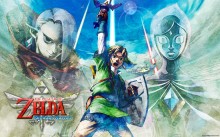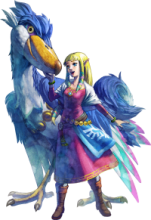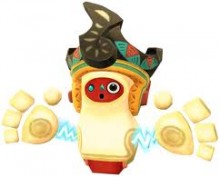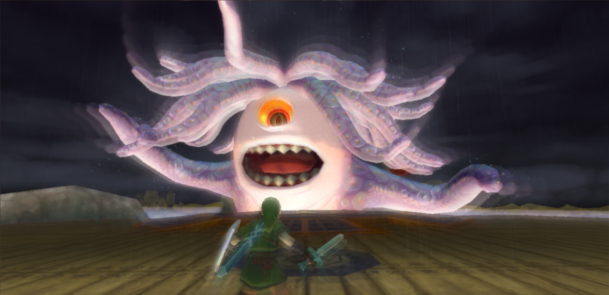Is Skyward Sword still good?
Posted on December 26 2013 by Legacy Staff
 Just over two years ago, during the height of the 25 year anniversary celebrations of The Legend of Zelda franchise, one of the most anticipated games in recent history was released: The Legend of Zelda: Skyward Sword. It garnered game of year accolades from several videogame publications, and some, including IGN, went as far as to say that Skyward Sword “is the greatest Zelda game ever created.” However, now that two years have passed, and the hype has worn off, is Skyward Sword as good as it was back in 2011? Hit the jump to read what I have to say on the matter!
Just over two years ago, during the height of the 25 year anniversary celebrations of The Legend of Zelda franchise, one of the most anticipated games in recent history was released: The Legend of Zelda: Skyward Sword. It garnered game of year accolades from several videogame publications, and some, including IGN, went as far as to say that Skyward Sword “is the greatest Zelda game ever created.” However, now that two years have passed, and the hype has worn off, is Skyward Sword as good as it was back in 2011? Hit the jump to read what I have to say on the matter!
First Play-Through Impressions
When Skyward Sword released in North America on November 20, 2011, I felt an eagerness and excitement that I hadn’t felt about a game in years. I was just beginning to accept my being a gamer and a nerd when this game came out, and picking up the pre-order bundle with the golden Zelda insignia-emblazoned Wii remote on launch day, popping that sucker into my Nintendo Wii, and playing for eight hours straight is honestly one of the fondest memories I have of a video game. I sat on my futon, mesmerized, watching the opening scenes and events transpire in front of me. It was nothing short of a work of art, and a masterpiece at that.
I instantly fell in love with the game, and I remember describing it to my friends as “nostalgic, even though I [was] playing it for the first time.” The elements that this new title brought to the table overwhelmed me with a sense of familiarity and comfort, and something that can only be described as “child-like wonder.” From what I could tell, it was everything a video game could possibly be, and most importantly, it was fun. During the time, I felt as if the video game industry was steering away from the core values of gaming. To me, at least, gaming was about escaping to a world unknown, experiencing things that the physical world forbids, and creating memories that would endure a lifetime. However, Skyward Sword had given me hope that those who created these products were still aware of what made a game greater than itself, and for the first time in a long time, I felt like a child once more.
For North American gamers across the country, we were fortunate enough for Skyward Sword to have been released to coincide with our Thanksgiving vacations, which was the perfect opportunity to pour hours upon hours into this hot new game. I seized the days, and from Sunday, the 20th, until Friday morning at four o’clock, the 25th, I was hooked on what I believed to be a flawless game. The motion controls were everything any Wii aficionado ever wanted from the system from day one. The writing and story were unmatched by any other in the franchise. The combat gave gamers the challenge that they had been waiting for since the days of the Nintendo Entertainment System. To put it plainly, I was in awe. Above all, however, the game gave me a reason to play it.
 After 25 years and 16 installments into the series, Nintendo finally gave the titular Zelda a role that would cause the player to have a vested interest in her as a character. For the first time while playing through any of the games, I truly cared about what happened to Zelda, which is what drove the story from the very beginning. Even though there is an overarching plot that involves the possible destruction of the world (as per usual in the Zelda series), it all boils down to returning Link’s childhood friend to their home in Skyloft safely. Due to the relationship established in the opening hours between Link and Zelda, every time you brush shoulders with the subject of Link’s affection, the fire inside of you burns even hotter, and the desire to rescue Link’s love grows larger. Because of this romance, I looked forward to progressing through the game and seeing what it had in store for me next, as I felt every step Link took was a step closer to finding Zelda, that everything had a purpose. The cut-scenes were filled with such true emotion, and at times I wanted to just sit back and allow the events to unfold in front of me. The cinematography moved me so much, as a matter of fact, that I was brought to tears when Zelda had to seal herself away in order to maintain the hold on Demise. It was an adventure that I would surely never forget.
After 25 years and 16 installments into the series, Nintendo finally gave the titular Zelda a role that would cause the player to have a vested interest in her as a character. For the first time while playing through any of the games, I truly cared about what happened to Zelda, which is what drove the story from the very beginning. Even though there is an overarching plot that involves the possible destruction of the world (as per usual in the Zelda series), it all boils down to returning Link’s childhood friend to their home in Skyloft safely. Due to the relationship established in the opening hours between Link and Zelda, every time you brush shoulders with the subject of Link’s affection, the fire inside of you burns even hotter, and the desire to rescue Link’s love grows larger. Because of this romance, I looked forward to progressing through the game and seeing what it had in store for me next, as I felt every step Link took was a step closer to finding Zelda, that everything had a purpose. The cut-scenes were filled with such true emotion, and at times I wanted to just sit back and allow the events to unfold in front of me. The cinematography moved me so much, as a matter of fact, that I was brought to tears when Zelda had to seal herself away in order to maintain the hold on Demise. It was an adventure that I would surely never forget.
After completing the game for the first time, I admired my save file and the play counter having read “44:34,” representing all that I had accomplished during the previous five days. I pondered what to do next, and all I could think to do was to start it all over again, and that’s exactly what I did. I had been so enchanted by this game, that I could not accept that it had ended. Skyward Sword had solidified a place in my heart forever.
Skyward Sword Revisited
When I applied for the position of an editorial writer at Zelda Dungeon two weeks ago, I was lucky enough to have been hired toward the beginning of my Christmas break. No classes or responsibilities for three weeks, and as such an opportunity could not be passed, I took full advantage, and essentially made playing video games and writing about them my job for once. So, I am playing through Skyward Sword again, and will attempt to review it through unbiased eyes.
The first thing that struck me after launching Skyward Sword was the wave of nostalgia that flooded my heart. Ah, yes, the music, the visuals, the characters were all so stunning once again. As I sat back on my couch and played through the game once more, I took note of several things that were worth mentioning, good and bad.
As Shigeru Miyamoto has gone on record saying several times, gameplay is one of the most imports facets of creating a good Zelda game. Skyward Sword’s was exceptional once again, inclusive of the plot, story, and controls. While Skyward Sword stayed true to the traditional Zelda plot-line (rescue Zelda and defeat the antagonist in order to save the world), it offered a fresh new aspect that seemed to be lacking in installments as of late. Throughout my time revisiting this game, I felt as if each action had a true purpose rather than simply going from Point A to Point B. As I said before, this was the first time where I actually cared about Zelda and what happened to her. Nintendo did an excellent job of creating a real relationship between our hero and Zelda by removing the title of “princess” from the latter, and abolished the gap between classes that exists in almost the entire series. This formed a “high school romance” between the two that honestly touched me. Link and Zelda’s flirtatious exchanges in Skyloft and their brief encounters with one another on the surface really showed me how much they cared about one another, and that made me want return Zelda to her home in Skyloft even more. Whenever Link was in reach of the subject of his affection, she was quickly taken away from him, but those short moments meant everything in driving the plot for our protagonists.
However, I seem to be forgetting about someone rather important… oh yeah, the oh-so-flamboyant Ghirahim. I must say, as much as I grew to truly despise the Demon Lord throughout the game, he was by far my favorite villain in the series. The kind of antagonist that Ghirahim was is one that the series has needed for a while. He drove the struggle for Link, and was the sole reason all of what was happening to him was occurring at all. He was perfect, as his presence was known from very early on in the game, and I wanted him dead until the very end. As far as the story goes, it was a touching performance by all, even though this was my seventh time playing the game.
When I was a student at my former university, my creative writing professor, a published author himself, explained to us the core attributes to good story telling. He said that an effective protagonist was one that was, metaphorically, stuck in a tree having bricks hurled at him. Essentially, if the protagonist, or in the case of Skyward Sword, protagonists, were going through a legitimate struggle, the story would drive itself. During my play through, I was just as enamored as before with the manner in which the story was developed from beginning to end. The romance between Link and Zelda was able to put our heroes into the metaphorical tree, and Ghirahim and fate were the metaphorical bricks. All in all, Skyward Sword ranks among the top stories of games I have played during my 20-year tenure of this life. However, Skyward Sword is not a book, and its elegant story, no matter how moving it may be, cannot be nor is it the driving force behind this game’s acclaim.
According to a certain angry video game nerd, namely the Angry Video Game Nerd, the most important part of any game is “being able to [expletive] play it!” The controls of Skyward Sword were brought with skepticism upon its release, and with good reason. The last Zelda title to feature motion controls, Twilight Princess, did not utilize them to their fullest potential, and did not elicit the feeling of truly wielding a sword or offer seamless motion-based control. Skyward Sword, on the other hand, maximized the potential that the Wii had all along with the Wii Motion Plus peripheral, which allowed 1:1 motion gaming. While I remembered being incredibly satisfied during my first play through of the game, this time around I found the control-scheme to be a bit bothersome. Don’t get me wrong, the motion control was nearly flawless, but the fact that I could not lie down lazily and play this game became irksome, as I was forced to sit with near-perfect posture if I wanted to minimize issues that would naturally come hand-in-hand with motion-controlled gaming. However, the precision of the Wii Motion Plus was a factor that made the game as enjoyable and immersive as it was. Unfortunately, I believe that I was blinded by the release day hype, as my most recent play through revealed things I simply could not overlook.
 By far the worst part about Skyward Sword is the companions, and yes, that was meant to be plural. Aside from the soulless Fi, Link is paired with the retrieving Lanayru robot, Scrapper. While I found his personality to be quite comical, he walked the fine line between comedy and irritation, and at times he cross it. However, his greatest issue was falling into the role of the “stupid companion,” a trap that befalls many a partner in video games. Particularly during the water basin transportation mission, Scrapper became even more bothersome than Fi. However, that was probably the only instance where I preferred Fi to Scrapper. Other than that, Fi interrupted my adventure more than a permissible amount of times, and her calculations and lack of emotions barred me from having any sentiment toward her. Whenever I first played Skyward Sword, I was actually quite fond of this spirit residing within the sword, comparing her to Navi, who I honestly did not mind too much. At least I could ignore Navi almost every time, though, but Fi’s comments all had to be blurted out as soon as they entered her brain. No, Fi, you do not need to tell me the batteries in my Wii remote are “nearly depleted.” Please do not break the fourth wall again. I don’t appreciate that. Fortunately, Fi’s and Scrapper’s presences were the two most major complaints in an overall great game. I have more gripes, but they are not major enough to go into full detail, and they are as follows:
By far the worst part about Skyward Sword is the companions, and yes, that was meant to be plural. Aside from the soulless Fi, Link is paired with the retrieving Lanayru robot, Scrapper. While I found his personality to be quite comical, he walked the fine line between comedy and irritation, and at times he cross it. However, his greatest issue was falling into the role of the “stupid companion,” a trap that befalls many a partner in video games. Particularly during the water basin transportation mission, Scrapper became even more bothersome than Fi. However, that was probably the only instance where I preferred Fi to Scrapper. Other than that, Fi interrupted my adventure more than a permissible amount of times, and her calculations and lack of emotions barred me from having any sentiment toward her. Whenever I first played Skyward Sword, I was actually quite fond of this spirit residing within the sword, comparing her to Navi, who I honestly did not mind too much. At least I could ignore Navi almost every time, though, but Fi’s comments all had to be blurted out as soon as they entered her brain. No, Fi, you do not need to tell me the batteries in my Wii remote are “nearly depleted.” Please do not break the fourth wall again. I don’t appreciate that. Fortunately, Fi’s and Scrapper’s presences were the two most major complaints in an overall great game. I have more gripes, but they are not major enough to go into full detail, and they are as follows:
- Dowsing was used way too much for puzzle solving. Finding items by the use of dowsing could have been a great opportunity for a more active role in minor characters.
- The three areas did not connect, and gave the game a lack of fluidity, especially considering that you have to fly in and out of the sky to reach the different regions.
- Why do I have to be greeted with a short cutscene almost every time I collect a treasure? The amber relic seems to be the worst offender, and I honestly tried to avoid collecting treasures whenever they came up just because I didn’t want my adventure to be interrupted.
- There was far too much dialogue. This caused the game to feel more like a movie at points, and while I appreciate great cinematography, sometimes I just wanted to play the game.
- Tentalus is just a fat Celia from Monsters Inc. Seriously. That was an honest issue due to the fact that the Lanayru Sand Sea and the Sandship were the most thought-out and well-developed areas in the game. When I got to the end of the Sandship and it was under attack, I was expecting a genuinely frightening Kraken. What I got was… not that.
In conclusion, Skyward Sword and the emotion it brought to the table were very similar to what I remember back in 2011. For example, the treasure and Tentalus complaints were two that I had when it was first released, and they were still minor issues this time around. However, I did not appreciate every cut-scene as much as I once did, and Fi and Scrapper annoyed me to no end. On a positive note, though, I still found the controls, music, and art style very fitting for this game, and it would definitely not be the same without them.
Verdict
Skyward Sword is without a doubt a great game. More than two years after its release, I still view it as one of my favorite games of all time. However, I feel as though I may have praised it far too much. My judgment was obviously clouded by my love for the series, and I was able to overlook these flaws. Now, with clearer eyes I can see that Skyward Sword is not perfect, but is still a masterpiece, and should be touted as such. Skyward Sword will still be revered for years to come, and will go down in history as one of the best games ever made.
How do you feel about Skyward Sword? Is it still as good as you remember, or is it possibly even better? Let us know in the comments below!




